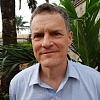Interview with Bruce Biber, outgoing head of the ICRC (International Committee of the Red Cross) Delegation in the Central-African Republic, who ended his mission at the end of September 2021.
According to media reports, the situation in CAR has been characterized by ups and downs since many years and is still alarming. What was the most recent impetus for increased fighting, who are the main actors and what is the situation now?
I would like to describe current developments in CAR looking at the situation before 15 December 2020 and after that. Before December 2020, the government controlled only about 30 percent of the territory of the country, while the rest was controlled by non-government armed groups. According to estimations, there were 1.2 million displaced persons out of the population of 5 million. The rule of law was weak, and in the areas out of government control - virtually non-existent. There was a very bad situation in terms of security that threatened the people, their livelihoods and humanitarian action.
Against this background, the government decided to conduct Presidential and Parliamentary elections in December 2020. There was a number of armed groups that refused to participate in the elections and declared a war on the government on 15 December.
During the first part of the fighting, the armed groups had quite a bit of success and took over 90 percent of the territory. On 13 January, they attacked Bangui, the capital of the country, and blockaded the city, trying to prevent any food and other vital supplies to come to the city. But by 30 January, the attempt to take over Bangui failed, and that was the beginning of a counter-offensive of government forces and their external partners. Basically, since January, the government, supported by its allies, has retaken progressively most of the national territory. Few places in the country remain in the hands of the non-state armed groups, but they continue to operate in some of the remote areas in the country.
Some of the elements of the armed groups are no longer under a command-and-control structure - they are left on their own and commit criminal acts against civilians and humanitarian actors. However, two of the armed groups have consolidated themselves again and conduct asymmetric type of warfare against the government and its allies. It is characterized by hit-and-run tactics, that sometimes threaten to trigger disproportionate responses from the government.
New means of warfare have emerged, such as the use of improvised explosive devices. According to the United Nations Office for the Coordination of Humanitarian Affairs, at least 23 civilians were killed by the devices between January and November 2021.
The economic cost of the use of such devices is very significant since they render large territories off limits to civilians and humanitarians. The problem is particularly serious in the North-West and West of the country.
It also appears that armed groups target traders and people engaged in commerce by attacking trucks and other means of transportation.
To conclude, insecurity is growing mainly because of two factors: the ongoing fighting in remote areas, especially in the North-West and in the Center-East in the Ouaka prefecture, as well as criminal activities conducted by armed elements not controlled by their leadership any longer.
The two non-state armed groups still strongly engaged in the fighting against the government and its allies originate predominantly from the Muslim community. While the government and its allies have been conducting stabilization operations, in particular, against these groups, there is, unfortunately, a growing perception among the Muslims that they have been disproportionally affected by the stabilization measures. This perception could prove counter-productive for the stabilization, reconciliation and peace-making efforts in the country.
You have already mentioned how armed clashed and insecurity affect the population of CAR. What is, in your opinion, the most serious humanitarian impact?
The number of internally displaced persons and refugees is actually higher than before the latest conflict started in mid-December 2020 and amounts to 1.3 million. The explosive devices are killing and maiming more and more people, isolating entire communities from the outside world. This is worsening an already grave food security situation. According to estimations, 2.8 million people, which constitutes more than a half of the population, are suffering from food insecurity. Many of the areas vulnerable in terms of food insecurity have become conflict zones, therefore diminishing people’s access to food and vital services and hampering humanitarian access and assistance.
Another very important consequence and feature of this conflict is violations of international humanitarian law (IHL) and human rights law. This has resulted in the loss of human lives, property and livelihoods. It has also instilled feelings of resentment, fear and even desire of revenge among many sections of the population. A particularly serious violation is sexual violence, which has increased remarkably since the current armed conflict began in December 2020. This type of violation is particularly divisive for communities and can only make instability and insecurity worse.
While being present in the country for many years, how does the ICRC respond to the situation now? What are the most acute needs, and is there a possibility to satisfy them?
Importantly, this is a situation corresponding to the core of the ICRC mandate, which is to support and protect victims of the armed conflict. What we are most proud of is our ability throughout the conflict to be able to obtain access to the areas most affected by the fighting. In many of these places we were the first humanitarian actor able to reach and to help the affected people.
The most immediate activity was to evacuate the wounded from both sides of the conflict. Together with the Central African Red Cross, we collected mortal remains of the killed during the fighting.
We spoke to the victims themselves and documented violations of IHL so that we could share them with parties concerned on a strictly confidential basis. We have also been visiting those who have been arrested and captured in relation to the fighting, and who remain in detention. We have been the only international organization to be able to do so on a regular basis.
The medical mission is particularly vital during this period of active hostilities. However, more than 70% of health services are provided by humanitarian organizations, which alone cannot cover the immense needs of the population. That’s why, another source of pride for us was the deployment of a surgical team to a hospital we support in Kaga-Bandoro. The team has managed to conduct an average of two surgical interventions a day since January 2021, saving hundreds of lives.
In addition, we have negotiated and conducted the delivery of food and non-food items to meet the most urgent needs of the population. In the first half of 2021 alone, we assisted about 50,000 people in most affected areas with basic food items.
We can see that it is not enough though to provide food aid – it is important to give victims of the conflict with the means to produce food themselves. We are still in an emergency phase, but we want to ensure that everything that we are doing is part of a long-term approach which aims at a more durable and more long-term humanitarian impact. Wherever we can, we support the government in providing vital services to the population, such as clean water supply, agricultural support and of course, health services. What we are trying to do, is to include a development dimension into our humanitarian action so that we could ensure long-term positive effect for the people of CAR.
Since you are giving an interview for the Russian audience, it would certainly be interesting to hear if you have had contacts with Russian officials on the ground.
As for the dialogue with Russian authorities and the Russian embassy, I should highlight that we have had excellent communication with the Russian Ambassador in CAR, and his team at the embassy. We share information about the humanitarian situation in the country, and we know that we can count on the Russian embassy in our efforts to implement our mission. This is particularly important for our efforts to support the CAR government to ensure respect of IHL.
The major concern for CAR is the question of IHL respect. In our opinion, it is critical to establish the rule of law and to fight against impunity, which is also one of the government’s objectives. Respect of IHL is a precondition of stability, and if a minimum of stability is not achieved, development efforts will not have much of an effect. The government of CAR has already made serious efforts in this regard. For example, in May 2021, it created a special commission for investigation of IHL violations. It is also working with the ICRC to ensure that all its security forces know and respect IHL. The Russian embassy and the ambassador are very supportive of these efforts, and it is important that this support on the part of Russia continues.






